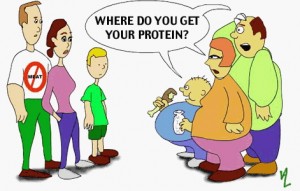Vegetarianism can be a good option, but it takes some planning

As seen in the Tulane Hullabaloo, 2/3/2012
Unlike fad diets that come and go, vegetarianism has always been visible in our society. Though vegetarianism has not been traditionally popular in our standard American diet, the plant-based diet that was once a foreign concept to many carnivorous Americans has grown in popularity in recent years. Even in a foodie paradise such as New Orleans, vegetarian and vegan options have increased, with entire restaurants dedicated to veggie fare and many popular restaurants offering vegetarian options. The modern movement of “going green” and living a healthier lifestyle is now mainstream, and it’s no wonder vegetarianism has been gaining momentum and grabbing even more of a foothold in our popular society.
Having a plant-based diet has many health benefits. Because of their healthy diet, vegetarians are at a lesser risk of heart disease, high blood pressure, strokes, some forms of cancer, diabetes, arthritis and various bowel disorders. Vegetarians consume less saturated fats, found in foods such as red meat, and more high fiber veggies, thus reducing their risk of developing many of these diseases.
Though vegetarianism has definite health benefits, there are some potential nutritional pitfalls. Vegetarians must pay particular attention to their diet to make sure that it is well-balanced and includes all the vitamins and minerals essential to health. In particular, a vegetarian diet may lack iron, calcium and vitamin B12.
Iron
A lack of iron in a diet is often manifested in anemia – a lack of appropriate red blood cells. A person who is iron deficient may feel tired and lack energy. Foods that are high in iron include chicken or fish, which are not on the menu for vegetarians. Unfortunately for vegetarians, iron from animal products is more easily absorbed than the iron from plant products, making adequate iron intake even more difficult for vegetarians. Vegetarians should focus on eating iron-rich foods such as lentils, beans, iron-fortified cereals and whole wheat breads. Iron is better absorbed when eaten with vitamin C, however, so include fruits and vitamin C-rich vegetables such as broccoli, cauliflower or cabbage in meals so the body can best utilize the iron.
Calcium
Calcium is another important mineral vegetarians need to consider. A lack of calcium is a risk factor in the development of weak bones or osteoporosis. There is plenty of calcium found in dairy products, so dairy-consuming vegetarians should be covered. Those who follow a vegan diet, however, need to make sure they have appropriate calcium intake. Try making calcium-enriched soy milk, soybeans and nuts part of your vegan diet.
Vitamin B12
Perhaps the trickiest vitamin for a vegetarian is B12. Vitamin B12 is essential for red blood cells and the nervous system, but the only reliable sources of B12 are meats and animal products. Vegetarians can find it in eggs and dairy, which should be able to meet most vegetarians’ B12 needs. Vegans, however, should consider consulting a dietician or supplementing their diet with a vitamin to ensure appropriate B12 intake.
 A common misconception about vegetarians is that they do not eat enough protein. Though animal products are a good source of protein, other foods such as legumes, tofu, eggs, dairy, nuts and seeds all contain protein. In general, healthy Americans eat more protein in their diets than they need, so a vegetarian eating a varied diet should receive an appropriate amount of protein.
A common misconception about vegetarians is that they do not eat enough protein. Though animal products are a good source of protein, other foods such as legumes, tofu, eggs, dairy, nuts and seeds all contain protein. In general, healthy Americans eat more protein in their diets than they need, so a vegetarian eating a varied diet should receive an appropriate amount of protein.
If you are considering converting to a vegetarian or vegan diet, or you are unsure if you are receiving appropriate nutrition, it is important to consult your doctor or a dietician. The Tulane Student Health Center offers nutrition services with registered dietitians and is a great resource for all students.
















